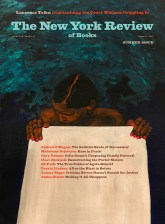In response to:
Shameful Profits from the April 20, 2023 issue
To the Editors:
In your issue of April 20, 2023, The New York Review published a letter to the editors [Manolis Vasilakis, “Shameful Profits”] in which the Bundesarchiv (Federal Archives) is accused of “profiting from the evidence of the Nazis’ crimes against humanity.” We reject this and take the following position.
The Bundesarchiv is required to apply the special regulation fee of the Federal Government Commissioner for Culture and Media to the use of images from the collection of the Federal Archives. This regulation stipulates that the use of images for noncommercial purposes is free of charge. For this reason, the statement “Anyone who wishes to reproduce one of these photographs of the Nazi atrocities…must pay the Bundesarchiv a sum ranging from forty-five to four hundred euros” does not apply in this respect. Individuals and institutions engaged in historical-political educational work, such as memorial centers, schools, and museums, are exempt from the fee, for example.
Only the use of images from the Federal Archives for commercial purposes is subject to a fee. This also includes the work of independent journalists that is ultimately aimed at making a profit. The fees do not constitute licenses or the “sale” of images. Private photography agencies have repeatedly urged the maintenance of the fees for the use of images from the Federal Archives in past years, as an important foundation of their business would otherwise be taken from them.
The Federal Archives is not interested in maintaining the obligation to pay fees for the commercial use of images from the period until 1945. During the consultations on the current fee regulations, the Federal Archives expressed its support for the fee exemption for the noncommercial use of images as well as the fee exemption for the use of documents from records. Both points were taken into consideration.
The Federal Archives has been cooperating closely with foreign memorial institutions, such as Yad Vashem and the United States Holocaust Memorial Museum, for decades. Going far beyond its statutory mandate, the Federal Archives actively participates in numerous long-standing measures for the reappraisal of National Socialist history, for example through the provision and maintenance of the online memorial book “Victims of the Persecution of Jews Under the National Socialist Tyranny in Germany 1933–1945” or involvement in the European Holocaust Research Infrastructure project. For years the Federal Archives has been focusing on digitizing documents from the period between 1933 and 1945, in order to make these documents accessible over the Internet not only to memorial institutions but also to the public.
In close coordination with the Federal Government Commissioner for Culture and Media as the superordinate body, the Federal Archives is seeking ways to discontinue the obligation to pay fees also for the commercial use of images from the period until 1945.
Dr. Robin Mishra
Director of Communications
Bundesarchiv
Berlin, Germany
Manolis Vasilakis replies:
Dr. Robin Mishra regrettably doesn’t address the issue I raised. Instead he repeats the regulations that can be found on the Bundesarchiv’s website. To the point: the general rules that Dr. Mishra repeats on behalf of the Bundesarchiv are the general rules that apply to all historical material indiscriminately, whether pre-war, postwar, or Holocaust material. My letter specifically refers to the latter. My issue is not with private archival material or professional historical photographs from, for example, the Adenauer period. I am talking about photographs of Nazi crimes until 1945 that were taken by military photographers working for the Nazi regime or by Nazi private photographers. I specifically questioned whether the Bundesarchiv has the moral or legal right to profit from the copyright of these specific photos. Whether we consider this sales, renting, rights of usage, or whatever else is beside the point. No matter what legal term we are using, the commercial use of this specific material by the Bundesarchiv is shameful.
I am pleased, however, to hear that “in close coordination with the Federal Government Commissioner for Culture and Media as the superordinate body, the Federal Archives is seeking ways to discontinue the obligation to pay fees also for the commercial use of images from the period until 1945.” I look forward to their response. It should not take another seventy-eight years for the Bundesarchiv to finally do the right thing.



